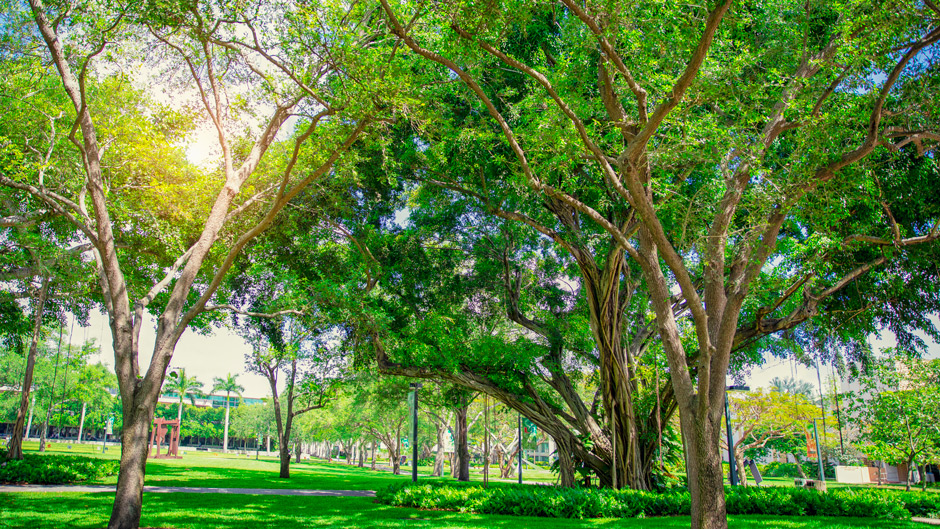As they walk through the University of Miami’s Coral Gables campus, many people are struck by the plethora of trees and greenery that surround them. Unfortunately, this is in stark contrast to many parts of the world where trees and forests, which play a vital role in our planet’s survival, are being rapidly destroyed due to deforestation.
According to the United Nations Food and Agriculture Organization, an estimated 18 million acres of forests are lost each year. In an effort to fight this problem, several countries are creating initiatives to plant more trees to reverse the effects this has caused to climate change. So how does this work? Kenneth Feeley, who is the Smathers Chair of Tropical Tree Biology in the Department of Biology at the University of Miami College of Arts and Sciences, said the science is clear.
“Planting trees reduces the amount of carbon dioxide in the air. When plants go through photosynthesis, the organisms soak up carbon from the air and use it for their metabolism to grow,” he said. “The more trees you plant, the more carbon is being taken out of the atmosphere.”
Most Recently, Ethiopia is believed to have broken the world record by planting 353 million trees in just 12 hours. Ethiopia's goal for the whole season is even bigger—the campaign is aiming to plant 4 billion trees in all. Although this is a step in the right direction, Feeley believes the crisis of climate change is much more complex.
“I don’t think this is the silver bullet that is going to save us. It is not as simple as planting trees. It is a complex equation. There are also other factors that come into play,” Feeley said.
Professor José Maria Cardoso da Silva in the College of Arts and Sciences agrees.
“We need to design a strategy for adaptation to global changes in the next century. We need to think about a lot of other aspects that can make our societies more resilient including protect our pristine ecosystems, shift from fossil fuels to renewable energy and produce foods by using less resources,” he said.
Cardoso da Silva is a biogeographer who studies the relationships between socio-economic development and environmental conservation in tropical regions. He said the main reason why deforestation in the tropics is so predominant is due to the high global demand for food production.
“All of the land that we clear in the tropics is turning into pasture for cattle or croplands. People need food, and land is most available in tropical countries. That is why these regions have been impacted the most in the last decades. We need to figure out how to conciliate food production and nature conservation. ” he said.
Feeley said governments need to find an answer to this problem in the next few decades.
“Growing a forest from scratch takes several decades. We have to ask ourselves how much time we actually have. We need to think about how we can take more immediate action in the next few decades,” he said.
On the upside, Elizabeth Plater-Zyberk, the Malcolm Matheson Distinguished Professor of Architecture and director of the Master of Urban Design Programwho teaches courses on urban design and built environment adaptation to climate change in the School of Architecture, thinks the initiative to plant more trees in populated cities can help mitigate the effects of climate change in unique ways.
“It could decrease the heat island effect of a city. Trees can shade and cool warm pavements and building roofs and walls,” she said. “There is also the fact that if sidewalks are cooled by shade, a person might indeed feel more encouraged to walk and drive less. There are so many different ways trees can help.”
Feeley also suggests another way in which people can reduce their carbon footprint is to reduce their intake of meat. He also urges people to be active in their political system.
“As individuals we need to vote to put people into office who can make decisions and understand the science behind what is causing climate change in our planet,” he said.

